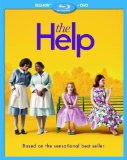| Reviews & Columns |
|
Reviews DVD TV on DVD Blu-ray 4K UHD International DVDs In Theaters Reviews by Studio Video Games Features Collector Series DVDs Easter Egg Database Interviews DVD Talk Radio Feature Articles Columns Anime Talk DVD Savant Horror DVDs The M.O.D. Squad Art House HD Talk Silent DVD
|
DVD Talk Forum |
|
|
| Resources |
|
DVD Price Search Customer Service #'s RCE Info Links |
|
Columns
|
|
|
Help, The
Walt Disney Studios Home Entertainment // PG-13 // December 6, 2011
List Price: $39.99 [Buy now and save at Amazon]
The Film:
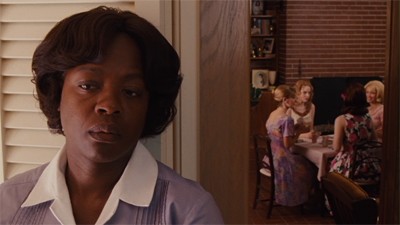 Kathryn Stockett wrote her wildly-popular novel The Help as a way of fondly remembering the black women who helped raise her, and her close friend, director Tate Taylor, during and after the civil rights surge in the '60s (and '70s). Taylor obviously gets the fondness that Stockett crams into her book, because his film version follows a similar tone. While it's still a drama, The Help opts for upbeat vibes and embellished characters over a closer, to-the-bone examination of relationships and the dire social issues of the '60s. Some might view it as overstated or even cloying (and they're not really off-base there), but there's also earnestness within Taylor's close-to-the-vest take that shouldn't be ignored. It's propelled by the pure intentions in telling an uplifting, triumphant story set during a pivotal transition point in American culture, grazing against the era's distresses without ignoring them and interesting itself with vivid characters that appeal to -- and touch -- a wide audience.
Kathryn Stockett wrote her wildly-popular novel The Help as a way of fondly remembering the black women who helped raise her, and her close friend, director Tate Taylor, during and after the civil rights surge in the '60s (and '70s). Taylor obviously gets the fondness that Stockett crams into her book, because his film version follows a similar tone. While it's still a drama, The Help opts for upbeat vibes and embellished characters over a closer, to-the-bone examination of relationships and the dire social issues of the '60s. Some might view it as overstated or even cloying (and they're not really off-base there), but there's also earnestness within Taylor's close-to-the-vest take that shouldn't be ignored. It's propelled by the pure intentions in telling an uplifting, triumphant story set during a pivotal transition point in American culture, grazing against the era's distresses without ignoring them and interesting itself with vivid characters that appeal to -- and touch -- a wide audience.
At the heart of early-1960s Mississippi, white families hired African-American women as everyday maids and newborn caregivers, but despite their integral place in their homes, some were unappreciated, mistreated, and exploited -- all stuff you likely know if you've taken a course in American history. In The Help, an up-and-coming writer and acitivist, Skeeter (Emma Stone), herself raised by one of these women, decides to write a piece from their viewpoint, full of interviews that focus on the ill-treatment, hardship ... and flickers of positivity from their line of work; a timely topic, given the thrust behind civil rights. From there, we follow three characters as her book gathers steam: Skeeter, and how she realizes her idea while avoiding the acidic snooping of her friend and help-employer, Hilly (an over-acting Bryce Dallas-Howard); Aibileen (Viola Davis), Skeeter's first contact, and the almost-motherly bond built between the maids and the children they raise; and Minny's (Octavia Spencer) tale of varied relationships with past and present employers, namely Celia (Jessica Chastain), a bubbly, loopy housewife and social pariah.
Tate Taylor, who up until recently only helmed minor indie projects, doesn't try to hide The Help's expected attempts at getting knee-jerk emotional responses to historical discrimination and bigotry, including scenes that involve "colored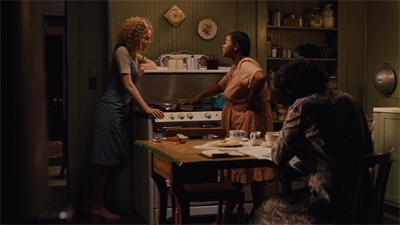 bathrooms" built in homes, sneering housewives thinking they're not the "true racists", emotional abuse, devious scheming, and period-relevant arrests. While maintaining this expressive streak for over two hours, Taylor's direction restrains the film's agendas, not allowing them to stretch beyond the emotional scope that the film's able to achieve -- for better or worse. If racism in '60s Mississippi is a dark, craggy well, then The Help could be seen as the story of a hand that reaches to grab those trapped in its depths, and less of a concise depiction of the well's nastiness. That's fine enough for the sake of telling an uplifting story about social change and breaking relationship barriers, but it also prevents it from achieving something singular, or defiantly great.
bathrooms" built in homes, sneering housewives thinking they're not the "true racists", emotional abuse, devious scheming, and period-relevant arrests. While maintaining this expressive streak for over two hours, Taylor's direction restrains the film's agendas, not allowing them to stretch beyond the emotional scope that the film's able to achieve -- for better or worse. If racism in '60s Mississippi is a dark, craggy well, then The Help could be seen as the story of a hand that reaches to grab those trapped in its depths, and less of a concise depiction of the well's nastiness. That's fine enough for the sake of telling an uplifting story about social change and breaking relationship barriers, but it also prevents it from achieving something singular, or defiantly great.
Without the performances, The Help could've easily unraveled into a tangle of blunt emotional exploit and hollow attempts to punctuate historical shame, as it's very much a piece of work that could effortlessly swing either way on one false dramatic note. Thankfully, Taylor's working with a (mostly) superb cast operating at the top of their game, who add resonance and depth where the writing can't afford much beyond blunt-force, surface-level motions. Skeeter's a determined tom-boy with a cancer-ridden mother (an always exquisite Allison Janney) who bucks her acquaintances' social norms and risks her neck for her beliefs, yet it's Emma Stone who gives her sleuthing an effervescent charm. Conversely, Aibileen's reserved, worrisome disposition reveals that she's weathered the darker sides of racism's effects, but Viola Davis' award-nominated performance invokes her gazes with the disarming, raw intensity that the writing can't achieve. These aren't intricately-written characters, nor are they free of easy stereotypical traits, but fluent performances do their damndest to make them appear so.
Arguably the bread-'n-butter to The Help's overarching themes, and easily the show-stealer, is the relationship between Minny and Celia, also one of the few truly inspired elements in the narrative. Here, we have a sass-mouthed (her words, not mine), stuck-in-her-ways maid in Minny who takes her employer -- a clumsy, chipper, buxom white woman who can't cook to save her life -- under her wing and glides through the ritzy décor of her large Mississippi mansion while showing her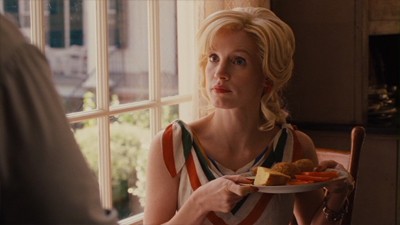 the ropes. Race and wealth simply don't factor into their bond; Celia's just overjoyed to have hired a maid who'll spend time with her, and Minny's glad to have a job. But it becomes more than that, a swirl of fried chicken and domestic woes, and it transforms into the film's biggest surprise. Octavia Spencer's unyielding, impish charisma shows that she earned every award under her belt for Minny, balancing period-bound stereotypes with an authentic character. Jessica Chastain deserves a lot of credit here, too: this marks one of three roles in 2011 where she played a housewife -- this, Tree of Life, and the brilliant Take Shelter -- and each one wildly differs from the other, all brilliant within their vastly disparate tones.
the ropes. Race and wealth simply don't factor into their bond; Celia's just overjoyed to have hired a maid who'll spend time with her, and Minny's glad to have a job. But it becomes more than that, a swirl of fried chicken and domestic woes, and it transforms into the film's biggest surprise. Octavia Spencer's unyielding, impish charisma shows that she earned every award under her belt for Minny, balancing period-bound stereotypes with an authentic character. Jessica Chastain deserves a lot of credit here, too: this marks one of three roles in 2011 where she played a housewife -- this, Tree of Life, and the brilliant Take Shelter -- and each one wildly differs from the other, all brilliant within their vastly disparate tones.
There's no vagueness propelling The Help though, really, no real doubts over where Tate Taylor and Kathryn Stockett will arrive with their characters in-tow -- even though there are a few tearjerker twists, some manipulative and others compelling, that complicate the journey. But that crowd-pleaser nature is practically embedded in the film's DNA code; the exchanges between tried-and-true effectual drama and indisputable schmaltz, coupled with the candid radiance in Stephen Goldblatt's sun-draped cinematography and Thomas Newman's vibrant score, speak volumes of the tone they desperately work towards building. And it's successful, mostly, in telling a familiar and inspiring story that'll satisfy those searching for dramatic entertainment with an emotional punch, though it's based more on the collective sentiment so richly poured into its 130+ minutes than an ability to dissect social issues or deconstruct stereotypes.
The Blu-ray:
The Help shows up on Blu-ray courtesy of the folks at Disney/Buena Vista Home Entertainment, available in two separate packages: a two-disc set, reviewed here, with Disc One housing the Blu-ray presentation and Disc Two as the standard, not-so-bare-boned DVD release; and a three-disc presentation that adds a digital copy of the film, though, aside from a purple-bordered slipcase instead of a blue one, that's the only real distinction between the two.
Video and Audio:
Stephen Goldblatt's resume stretches across a pretty darn diverse catalogue of movies, from Joe Versus the Volcano and Striptease to Schumacher's Batman films, and if that says anything about his work, it's this: he knows his way around a vivid color palette, lush skin tones, and a tight zoom. The way he shot The Help falls more in line with his intimate, close-up-heavy composition in The Hunger and Closer though, encapsulated in an exquisite, rustic 1.85:1 1080p AVC treatment from Buena Vista / Dreamworks that flows eloquently along the Mississippi streets, cottages, and mansions captured in the film. Radiant skin tones and vibrant '60s costume work show off the disc's nimble eye for eye-popping color gradation, while fine detail emerges in the tendrils in Emma Stone's hair, the weave and folds in furniture, and the breading of fried chicken. Daytime sequences maintain vivid but controlled contrast, while darker sequences latch onto pleasant-enough black levels. In short, it's a very sharp treatment.
The only things you really need to concern yourself with in The Help's audio treatment is the clarity of the dialogue, the spatial stretch of the music, and how the disc preserves the few instances of silence that crop up in the picture. This DTS-HD Master Audio offers a clean sweep on these elements: Emma Stone's delightfully gravelly voice remains clear and punchy, while the lower-ranged tones with Viola Davis and Octavia Spencer preserve a rich mid-range foundation for verbal succinctness; Thomas Newman's score tinkers, strums, and bounces to the rear channels for the bulk of the surround activity at-work here; and the scenes involving only subtle sound effects -- the pitter-patter of Stone's feet on wood and the scramble of a car's tires on gravel -- create an enveloping aural design that nails the "bucolic" feel down just right. English, French, and Spanish subs accompany the release.
Special Features:
 The Making of The Help: From Friendship to Film (23:25, HD):
The Making of The Help: From Friendship to Film (23:25, HD):
When it says "Making of The Help", they're actually referring to both the book and the movie, crammed into a twenty-minute stretch -- and it's rightly-paced and highly watchable because of it. It starts with Kathryn Stockett's conceptualization and incorporates personal stories involving her and director Tate Taylor, then allows the friendships between the cast members to emerge -- involving writing Minny specifically for Octavia Spencer, Thanksgiving dinners, and low-budget movies. That occurs while candid digitally-shot photography, spliced in with the other material, moves through specific shooting locations as Taylor discusses the locations and their significance, tossing in the occasional interview with a cast member or a house owner for good measure. It's a short but pleasant -- and lukewarmly eye-opening -- glimpse into the creative process of the book and the film.
We've also got a featurette entitled In Their Own Words: A Tribute to the Maids of Mississippi (11:51, HD) where a group of retired maids and other professions enjoy a dialogue with Tate Taylor and Octavia Spencer, as well as a slate of five Deleted Scenes (9:36, HD) with introductions from director Taylor, and a Music Video for "The Living Proof" by Mary J. Blige. For reference, the DVD copy of the film also comes with some of the deleted scenes and the music video.
Final Thoughts:
The Help might be a historical tearjerker topic movie, but it's a polished, well-acted charmer of one. Tate Taylor brings Kathryn Stockett's mammoth of a best-selling novel to the big screen with all its ducks in a row: cherry-picked actresses that bring the characters to life, intimate cinematography that captures the Mississippi shooting locales, and a clear, if exaggerated perspective on the relationships that defy and weigh down racial divides. More than that, though, it's a warming time-capsule of a dark time in American society that's told with a clear, vibrant tonal perspective and performed exquisitely -- especially from Viola Davis, Octavia Spencer, and Jessica Chastain, all rightly deserving of their heaps of praise -- and even though the drama doesn't have the teeth it probably should, it pulls up the slack with the way the actresses elevate their respective characters' complexity. Disney brings 2011's surprise hit to Blu-ray in a solid high-definition package, presenting the film with exceptional, warm, enveloping audiovisual properties, and it's a good thing that the film looks and sounds great, because it'll make up for the paltry special features -- aside from a pretty solid twenty-minute doc and a batch of deleted scenes. Strongly Recommended.
Thomas Spurlin, Staff Reviewer -- DVDTalk Reviews | Personal Blog/Site
 Kathryn Stockett wrote her wildly-popular novel The Help as a way of fondly remembering the black women who helped raise her, and her close friend, director Tate Taylor, during and after the civil rights surge in the '60s (and '70s). Taylor obviously gets the fondness that Stockett crams into her book, because his film version follows a similar tone. While it's still a drama, The Help opts for upbeat vibes and embellished characters over a closer, to-the-bone examination of relationships and the dire social issues of the '60s. Some might view it as overstated or even cloying (and they're not really off-base there), but there's also earnestness within Taylor's close-to-the-vest take that shouldn't be ignored. It's propelled by the pure intentions in telling an uplifting, triumphant story set during a pivotal transition point in American culture, grazing against the era's distresses without ignoring them and interesting itself with vivid characters that appeal to -- and touch -- a wide audience.
Kathryn Stockett wrote her wildly-popular novel The Help as a way of fondly remembering the black women who helped raise her, and her close friend, director Tate Taylor, during and after the civil rights surge in the '60s (and '70s). Taylor obviously gets the fondness that Stockett crams into her book, because his film version follows a similar tone. While it's still a drama, The Help opts for upbeat vibes and embellished characters over a closer, to-the-bone examination of relationships and the dire social issues of the '60s. Some might view it as overstated or even cloying (and they're not really off-base there), but there's also earnestness within Taylor's close-to-the-vest take that shouldn't be ignored. It's propelled by the pure intentions in telling an uplifting, triumphant story set during a pivotal transition point in American culture, grazing against the era's distresses without ignoring them and interesting itself with vivid characters that appeal to -- and touch -- a wide audience. At the heart of early-1960s Mississippi, white families hired African-American women as everyday maids and newborn caregivers, but despite their integral place in their homes, some were unappreciated, mistreated, and exploited -- all stuff you likely know if you've taken a course in American history. In The Help, an up-and-coming writer and acitivist, Skeeter (Emma Stone), herself raised by one of these women, decides to write a piece from their viewpoint, full of interviews that focus on the ill-treatment, hardship ... and flickers of positivity from their line of work; a timely topic, given the thrust behind civil rights. From there, we follow three characters as her book gathers steam: Skeeter, and how she realizes her idea while avoiding the acidic snooping of her friend and help-employer, Hilly (an over-acting Bryce Dallas-Howard); Aibileen (Viola Davis), Skeeter's first contact, and the almost-motherly bond built between the maids and the children they raise; and Minny's (Octavia Spencer) tale of varied relationships with past and present employers, namely Celia (Jessica Chastain), a bubbly, loopy housewife and social pariah.
Tate Taylor, who up until recently only helmed minor indie projects, doesn't try to hide The Help's expected attempts at getting knee-jerk emotional responses to historical discrimination and bigotry, including scenes that involve "colored
 bathrooms" built in homes, sneering housewives thinking they're not the "true racists", emotional abuse, devious scheming, and period-relevant arrests. While maintaining this expressive streak for over two hours, Taylor's direction restrains the film's agendas, not allowing them to stretch beyond the emotional scope that the film's able to achieve -- for better or worse. If racism in '60s Mississippi is a dark, craggy well, then The Help could be seen as the story of a hand that reaches to grab those trapped in its depths, and less of a concise depiction of the well's nastiness. That's fine enough for the sake of telling an uplifting story about social change and breaking relationship barriers, but it also prevents it from achieving something singular, or defiantly great.
bathrooms" built in homes, sneering housewives thinking they're not the "true racists", emotional abuse, devious scheming, and period-relevant arrests. While maintaining this expressive streak for over two hours, Taylor's direction restrains the film's agendas, not allowing them to stretch beyond the emotional scope that the film's able to achieve -- for better or worse. If racism in '60s Mississippi is a dark, craggy well, then The Help could be seen as the story of a hand that reaches to grab those trapped in its depths, and less of a concise depiction of the well's nastiness. That's fine enough for the sake of telling an uplifting story about social change and breaking relationship barriers, but it also prevents it from achieving something singular, or defiantly great. Without the performances, The Help could've easily unraveled into a tangle of blunt emotional exploit and hollow attempts to punctuate historical shame, as it's very much a piece of work that could effortlessly swing either way on one false dramatic note. Thankfully, Taylor's working with a (mostly) superb cast operating at the top of their game, who add resonance and depth where the writing can't afford much beyond blunt-force, surface-level motions. Skeeter's a determined tom-boy with a cancer-ridden mother (an always exquisite Allison Janney) who bucks her acquaintances' social norms and risks her neck for her beliefs, yet it's Emma Stone who gives her sleuthing an effervescent charm. Conversely, Aibileen's reserved, worrisome disposition reveals that she's weathered the darker sides of racism's effects, but Viola Davis' award-nominated performance invokes her gazes with the disarming, raw intensity that the writing can't achieve. These aren't intricately-written characters, nor are they free of easy stereotypical traits, but fluent performances do their damndest to make them appear so.
Arguably the bread-'n-butter to The Help's overarching themes, and easily the show-stealer, is the relationship between Minny and Celia, also one of the few truly inspired elements in the narrative. Here, we have a sass-mouthed (her words, not mine), stuck-in-her-ways maid in Minny who takes her employer -- a clumsy, chipper, buxom white woman who can't cook to save her life -- under her wing and glides through the ritzy décor of her large Mississippi mansion while showing her
 the ropes. Race and wealth simply don't factor into their bond; Celia's just overjoyed to have hired a maid who'll spend time with her, and Minny's glad to have a job. But it becomes more than that, a swirl of fried chicken and domestic woes, and it transforms into the film's biggest surprise. Octavia Spencer's unyielding, impish charisma shows that she earned every award under her belt for Minny, balancing period-bound stereotypes with an authentic character. Jessica Chastain deserves a lot of credit here, too: this marks one of three roles in 2011 where she played a housewife -- this, Tree of Life, and the brilliant Take Shelter -- and each one wildly differs from the other, all brilliant within their vastly disparate tones.
the ropes. Race and wealth simply don't factor into their bond; Celia's just overjoyed to have hired a maid who'll spend time with her, and Minny's glad to have a job. But it becomes more than that, a swirl of fried chicken and domestic woes, and it transforms into the film's biggest surprise. Octavia Spencer's unyielding, impish charisma shows that she earned every award under her belt for Minny, balancing period-bound stereotypes with an authentic character. Jessica Chastain deserves a lot of credit here, too: this marks one of three roles in 2011 where she played a housewife -- this, Tree of Life, and the brilliant Take Shelter -- and each one wildly differs from the other, all brilliant within their vastly disparate tones. There's no vagueness propelling The Help though, really, no real doubts over where Tate Taylor and Kathryn Stockett will arrive with their characters in-tow -- even though there are a few tearjerker twists, some manipulative and others compelling, that complicate the journey. But that crowd-pleaser nature is practically embedded in the film's DNA code; the exchanges between tried-and-true effectual drama and indisputable schmaltz, coupled with the candid radiance in Stephen Goldblatt's sun-draped cinematography and Thomas Newman's vibrant score, speak volumes of the tone they desperately work towards building. And it's successful, mostly, in telling a familiar and inspiring story that'll satisfy those searching for dramatic entertainment with an emotional punch, though it's based more on the collective sentiment so richly poured into its 130+ minutes than an ability to dissect social issues or deconstruct stereotypes.
The Blu-ray:
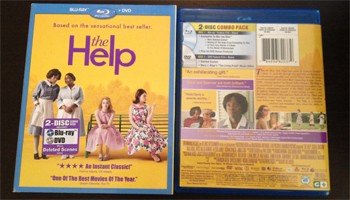 | 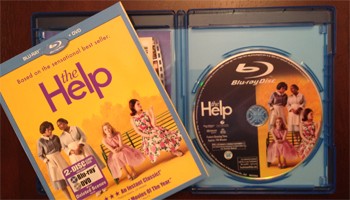 |
The Help shows up on Blu-ray courtesy of the folks at Disney/Buena Vista Home Entertainment, available in two separate packages: a two-disc set, reviewed here, with Disc One housing the Blu-ray presentation and Disc Two as the standard, not-so-bare-boned DVD release; and a three-disc presentation that adds a digital copy of the film, though, aside from a purple-bordered slipcase instead of a blue one, that's the only real distinction between the two.
Video and Audio:
Stephen Goldblatt's resume stretches across a pretty darn diverse catalogue of movies, from Joe Versus the Volcano and Striptease to Schumacher's Batman films, and if that says anything about his work, it's this: he knows his way around a vivid color palette, lush skin tones, and a tight zoom. The way he shot The Help falls more in line with his intimate, close-up-heavy composition in The Hunger and Closer though, encapsulated in an exquisite, rustic 1.85:1 1080p AVC treatment from Buena Vista / Dreamworks that flows eloquently along the Mississippi streets, cottages, and mansions captured in the film. Radiant skin tones and vibrant '60s costume work show off the disc's nimble eye for eye-popping color gradation, while fine detail emerges in the tendrils in Emma Stone's hair, the weave and folds in furniture, and the breading of fried chicken. Daytime sequences maintain vivid but controlled contrast, while darker sequences latch onto pleasant-enough black levels. In short, it's a very sharp treatment.
The only things you really need to concern yourself with in The Help's audio treatment is the clarity of the dialogue, the spatial stretch of the music, and how the disc preserves the few instances of silence that crop up in the picture. This DTS-HD Master Audio offers a clean sweep on these elements: Emma Stone's delightfully gravelly voice remains clear and punchy, while the lower-ranged tones with Viola Davis and Octavia Spencer preserve a rich mid-range foundation for verbal succinctness; Thomas Newman's score tinkers, strums, and bounces to the rear channels for the bulk of the surround activity at-work here; and the scenes involving only subtle sound effects -- the pitter-patter of Stone's feet on wood and the scramble of a car's tires on gravel -- create an enveloping aural design that nails the "bucolic" feel down just right. English, French, and Spanish subs accompany the release.
Special Features:
 The Making of The Help: From Friendship to Film (23:25, HD):
The Making of The Help: From Friendship to Film (23:25, HD): When it says "Making of The Help", they're actually referring to both the book and the movie, crammed into a twenty-minute stretch -- and it's rightly-paced and highly watchable because of it. It starts with Kathryn Stockett's conceptualization and incorporates personal stories involving her and director Tate Taylor, then allows the friendships between the cast members to emerge -- involving writing Minny specifically for Octavia Spencer, Thanksgiving dinners, and low-budget movies. That occurs while candid digitally-shot photography, spliced in with the other material, moves through specific shooting locations as Taylor discusses the locations and their significance, tossing in the occasional interview with a cast member or a house owner for good measure. It's a short but pleasant -- and lukewarmly eye-opening -- glimpse into the creative process of the book and the film.
We've also got a featurette entitled In Their Own Words: A Tribute to the Maids of Mississippi (11:51, HD) where a group of retired maids and other professions enjoy a dialogue with Tate Taylor and Octavia Spencer, as well as a slate of five Deleted Scenes (9:36, HD) with introductions from director Taylor, and a Music Video for "The Living Proof" by Mary J. Blige. For reference, the DVD copy of the film also comes with some of the deleted scenes and the music video.
Final Thoughts:
The Help might be a historical tearjerker topic movie, but it's a polished, well-acted charmer of one. Tate Taylor brings Kathryn Stockett's mammoth of a best-selling novel to the big screen with all its ducks in a row: cherry-picked actresses that bring the characters to life, intimate cinematography that captures the Mississippi shooting locales, and a clear, if exaggerated perspective on the relationships that defy and weigh down racial divides. More than that, though, it's a warming time-capsule of a dark time in American society that's told with a clear, vibrant tonal perspective and performed exquisitely -- especially from Viola Davis, Octavia Spencer, and Jessica Chastain, all rightly deserving of their heaps of praise -- and even though the drama doesn't have the teeth it probably should, it pulls up the slack with the way the actresses elevate their respective characters' complexity. Disney brings 2011's surprise hit to Blu-ray in a solid high-definition package, presenting the film with exceptional, warm, enveloping audiovisual properties, and it's a good thing that the film looks and sounds great, because it'll make up for the paltry special features -- aside from a pretty solid twenty-minute doc and a batch of deleted scenes. Strongly Recommended.
|
| Popular Reviews |
| Sponsored Links |
|
|
| Sponsored Links |
|
|
| Release List | Reviews | Shop | Newsletter | Forum | DVD Giveaways | Blu-Ray | Advertise |
|
Copyright 2024 DVDTalk.com All Rights Reserved. Legal Info, Privacy Policy, Terms of Use,
Manage Preferences,
Your Privacy Choices | |||||||









